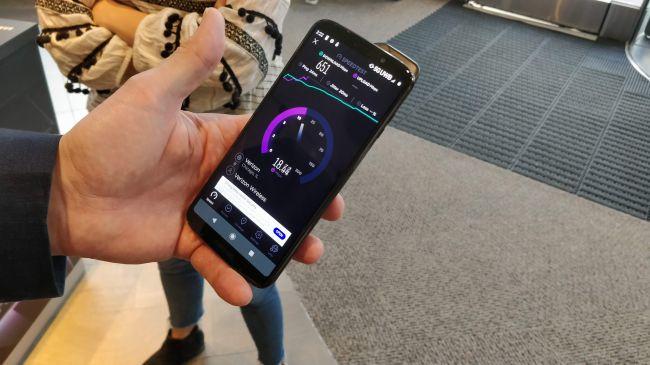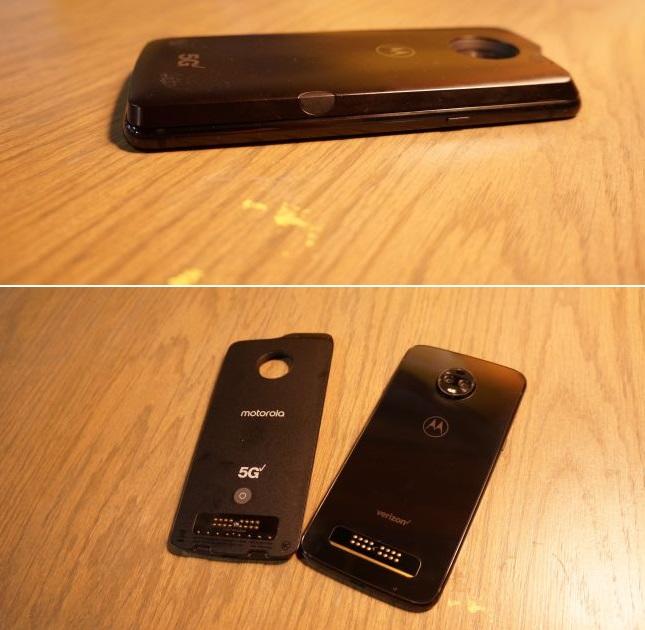With Verizon having switched on its 5G wireless network in two markets this week – Chicago and Minneapolis, the folks over at TechRadar hit the streets of Chicago after the Verizon launch event with the only working 5G handset they could get their hands on.

After TechRadar “literally cobbled together the world’s first 5G phone when we slapped the newly-launched 5G Moto Mod onto the back of an existing 4G phone,” they took their Moto Z3 with the 5G mod and “hung around in the limited spaces where 5G signal was being broadcast.”
The results were interesting, to say the least, as finding and maintaining solid 5G signal proved difficult, since its “millimeter wave technology” is apparently fairly dependent on line of sight.
Over the course of our initial hands-on, we seriously questioned Verizon’s 5G network’s reliability.
Take the Verizon Store where the event took place: it was scarcely bigger than 30 feet across and 100 feet back, with a 5G node in the front of the building. Reception was spotty toward the back, and could even peter out near the front. We noticed the Moto Z3 switch from 5G to 4G LTE on multiple occasions as we moved around, and had to keep checking that our speed tests were 5G all the way through. –TechRadar
AT the Verizon store, the 5G modded Moto Z3 hit speeds of more than 650 Mbps. Downloading a 1.81 GB PUBG Mobile game over the 5G network took just under 4 and a half minutes, while taking 6 minutes and 8 seconds on the 4G network. As TechRadar notes, “while the 5G network is clearly the faster of the two, it’s not by an order of magnitude.”
Walking around Chicago – areas with strong reception provided downloads of more than 400 Mbps.
Read TechRadar’s ongoing hands-on test here. Their findings as of this writing are below:
4/5, 1:30 pm CT: Checking to make sure Netflix and the Play Store weren’t a speed bottleneck, we connected to Wi-Fi and retried the downloads. The movie downloaded at close to 20MB/s and the game downloaded at about 13MB/s, vastly exceeding what we could get on our 5G connection.
4/5, 12:59 pm CT: Took another 5G field trip, and found a consistent signal at the base of a building that seemed like it would have actually blocked signal. A few speed tests that exceeded 400Mbps confirmed we had a real 5G connection, though a test using a single data stream showed only 17.3Mbps downstream. In between multiple tests that showed high speeds, we attempted to download another movie on Netflix and a game on the Play Store, but neither managed to download much faster than 1MB/s, whereas a 400Mbps connection should offer up to 50MB/s download speeds.
4/5, 9:10 am CT: Further into West Loop, found a semi-stable 5G signal and ran a series of speed tests, getting 292Mbps, 113Mbps, 65.5Mbps, and 240Mbps. The speed tests didn’t show a correlation between 5G signal strength and speeds.
4/5, 8:58 am CT: Walked into the West Loop on a street that has frequent wide views of The Loop. Once again, experienced 4G and 5G quickly switching back and forth. Ran a speed test while the network was toggling and got 47.4Mbps downstream.
4/4, 5:25 pm CT: Left the West Loop after a day generally spent without 5G. The millimeter wave technology used is fairly dependent on line of sight, and that can be hard to find, but we’ll keep trying.
4/4, 12:30 pm CT: Popping back outside into the rain to see how long it’d take to download The Raid Redemption at 446MB on the 5G network, we gave up after 2 minutes and 30 seconds that had only netted 44MB. A quick speed test showed the lowest speeds we’d seen all day at 59.9Mbps. Never mind downloading a whole TV show season before a flight takes off, we couldn’t even download Iko Uwais kicking his first ass.
4/4, 12:08 pm CT: Went into the grocery store on that same corner and couldn’t get 5G even sitting next to a window near that corner.
4/4, 11:56 am CT: Took the Moto Z3 out for a walk in the West Loop, because the 5G signal couldn’t bother to join me indoors on this cold and rainy day. Found a corner closer to The Loop that had 5G signal, though it was still spotty. Ran a speed test that hit 448Mbps downstream with a 19ms ping time.
via ZeroHedge News http://bit.ly/2U1YfCi Tyler Durden
